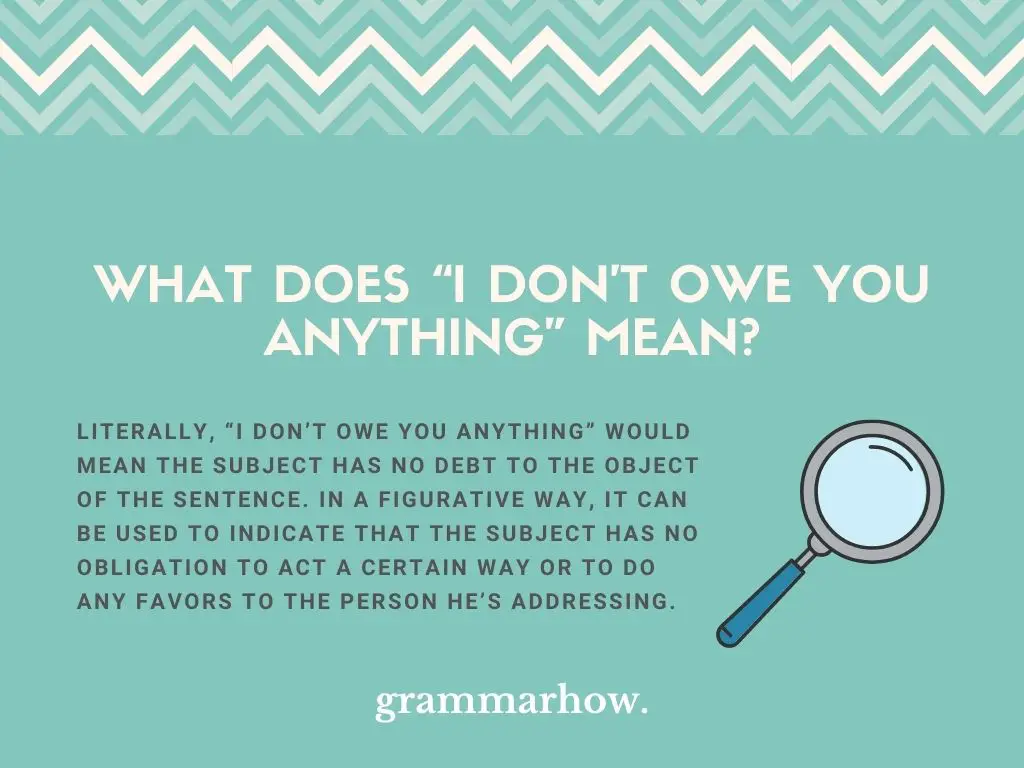You have probably seen the phrase “I Don’t Owe You Anything” in movies and books. It’s a strong expression, meant to have some effect on the listener. But what exactly does it mean?
We want to look into it and find out its meaning and when we can use it.
What Does “I Don’t Owe You Anything” Mean?
Literally, “I Don’t Owe You Anything” would mean the subject has no debt to the object of the sentence. In a figurative way, it can be used to indicate that the subject has no obligation to act a certain way or to do any favors to the person he’s addressing.

It’s easier to see it at work in a sentence, so let’s begin by looking at some examples of “I Don’t Owe You Anything” at work:
- Don’t ask me to help, I don’t owe you anything.
- Clara has to move on and understand I don’t owe her anything.
As you can possibly sense by the sentences, “I Don’t Owe You Anything” carries a level of antagonism, the idea that one party doesn’t want to cooperate or be around the other.
How to Use “I Don’t Owe You Anything” In a Sentence
“I Don’t Owe You Anything” is a strong phrase. You should use it whenever you want to make it clear that you want nothing to do with the person you’re talking to. It’s a direct and assertive statement, so you should make sure this is the tone you want to convey.
Let’s go over some more examples:
- You’ve never helped me, so now I don’t owe you anything.
- I don’t owe you anything for this, because I didn’t ask for your help.
- You treated me horribly before, I don’t owe you anything.
- I don’t owe Peter anything, and he should get over himself.
- Heath couldn’t believe you’d approach him asking for help. He doesn’t owe you anything.
Is “I Don’t Owe You Anything” Rude?
“I Don’t Owe You Anything” is certainly a strong, assertive statement. But it’s not necessarily rude. Breakups, disagreements, and arguments aren’t usually fun, and carry some level of antagonism. But does it mean they’re rude? Not really. It’s the same idea as “I Don’t Owe You Anything”.
“I Don’t Owe You Anything” or “I Don’t Owe You Nothing”?
“I Don’t Owe You Anything” is the correct way to express that you want to have nothing to do with the person you’re talking to.
“I Don’t Owe You Nothing” is actually incorrect because the double negative (“don’t” and “nothing”) turns the phrase into something positive. It actually means “I owe you something” (if not everything).
For “I Don’t Owe You Nothing” to work, it should actually be “I Owe You Nothing”.
Let’s take a look at some examples:
- I don’t owe you nothing. (incorrect)
- I don’t owe you anything.
- I owe you nothing.
- Don’t come asking for favors, I don’t owe you nothing.
- Don’t come asking for favors, I don’t owe you anything.
- Find someone else to help, I don’t owe you nothing.
- Find someone else to help, I owe you nothing.
Let’s take a look at the graph from Google Ngram Viewer below, to find out which form is used more often, “I Don’t Owe You Anything” or “I Don’t Owe You Nothing”.

Considering “I Don’t Owe You Nothing” is incorrect, the graph shows exactly what we expected to see. “I Don’t Owe You Anything” is used with much more frequency and is the prevalent form in that scenario.
“I Don’t Owe You Anything” – Synonyms
There are alternative ways to send the same message as “I Don’t Owe You Anything”. If you think this expression is too harsh, or if you think you’d be comfortable saying it in a different way, here are some synonyms that you can apply to your speech:
- I owe you nothing
- I’m not indebted to you
- We’re even
- You don’t have any merit
- I don’t have to do this for you
Final Thoughts
“I Don’t Owe You Anything” is an expression that states the subject has no obligation or moral binding to do what is being asked of them. It’s an assertive, very direct way to make a statement and say that you don’t want to have anything to do with that person.
